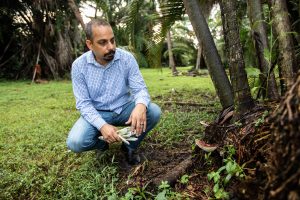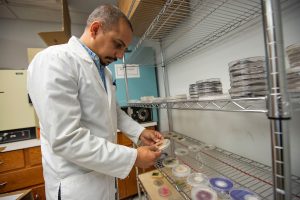Gainesville, Florida, USA
September 8, 2025
 Braham Dhillon inspecting a palm tree showing symptoms of the lethal disease, Ganoderma. Photo by Tyler jones, UF/IFAS.
Braham Dhillon inspecting a palm tree showing symptoms of the lethal disease, Ganoderma. Photo by Tyler jones, UF/IFAS.
Named after the Roman god who once guarded wheat fields from blight, Robigus is the newest tech ally in the fight against plant diseases. Developed by a scientist at the University of Florida Institute of Food and Agricultural Sciences (UF/IFAS), the app can help detect crop threats globally with the tap of a screen or keyboard.
The app is already available to growers, scientists, homeowners and hosted on UF’s supercomputer, HiPerGator.
Braham Dhillon is a molecular plant pathologist at the UF/IFAS Fort Lauderdale Research and Education Center and a specialist in fungal pathogens of palms, woody plants and agricultural crops. His research program combines basic and applied science to better understand how these pathogens infect and spread.
“Plant diseases don’t respect borders,” Dhillon said. “With Robigus, we now have a way to see them globally. That kind of knowledge is essential for protecting crops and food security.”
The creation of Robigus stemmed from a challenge Dhillon faced in his own research: While valuable plant disease data exists, it’s scattered across thousands of scientific journals and early or “first reports” documenting new disease outbreaks. These “” are often the initial records of emerging threats to crops—but they can be hard to find and access. He’s not alone in facing that challenge.
“A lot of labs around the world publish plant disease reports, but they often sit as individual articles on publishers’ websites,” Dhillon said. “There’s a tremendous amount of information — pathogen names, host plants, locations, years of discovery — but it’s locked in text. I built Robigus to bring that data together in a way that’s searchable and interactive.”

Braham Dhillon in his lab UF/IFAS Fort Lauderdale Research and Education Center working with samples of fungus that impact woody trees. Photo by Tyler Jones, UF/IFAS.
Robigus draws from 45 years of global plant disease records, collating reports from countries including the United States, India, Brazil, South Korea, Mexico and China. The interface allows users to filter by crop, pathogen, country or year. The result is a dynamic map and dataset that visualizes where diseases have been reported and when.
For scientists, Robigus offers a powerful tool to study pathogen activity, diversity, track the emergence of a disease and even anticipate disease risks.
“For Extension agents and growers, it’s a practical resource to answer questions like, ‘Has this disease been reported in my region?’ or ‘What threats exist for palms, mangoes, lychees or bananas?’” he said.
Additionally, homeowners with struggling fruit trees can use the app to see what diseases have been documented on that species worldwide.
As an example, Dhillon pointed to Tropical Race 4 of Fusarium wilt in bananas. This devastating disease threatens Cavendish bananas, which make up about 99% of global banana exports and are the standard banana found in most supermarkets.
“Once confined to Asia, it has spread to Turkey and South America — movements that Robigus clearly traces in its dataset,” he said. “You can watch the disease history unfold with the earliest records from Asia, then new reports appear in South America. The app helps us visualize not just where the diseases are, but how they move.”